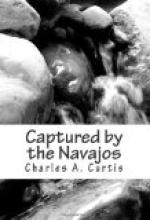They had always been known as a pastoral race, raising flocks and herds, and tilling the soil. They owned, at the time we began war upon them, sheep and ponies by the thousand, and raised large quantities of corn, wheat, beans, and other products.
They numbered between twelve and fifteen thousand, and could put three thousand mounted warriors in the field. They were industrious, the men doing all the hard work instead of putting it upon the women, as do the Indians of the plains and all of the marauding tribes. They manufactured their wearing apparel, and made their own weapons, such as bows, arrows, and lances. They wove beautiful blankets, often very costly, and knit woollen stockings, and dressed in greater comfort than did most other tribes. In addition to a somewhat brilliant costume, they wore numerous strings of fine coral, shells, and many ornaments of silver, and usually appeared in cool weather with a handsome blanket thrown over the shoulders.
The Navajos and the New Mexicans were almost continually at war. Expeditions were frequently fitted out in the border towns by the class of New Mexicans who possessed no land or stock, for the sole purpose of capturing the flocks and herds of the Navajos. The Indians retaliated in kind, making raids upon the settlements and pasture lands, and driving off sheep, horses, and cattle to the mountains. Complaints were made by the property-holders, and war was declared against the Indians.
The military department of New Mexico was in fine condition to carry on a successful war. Besides our regiment of regular infantry, it had two regiments of California volunteer infantry and one regiment each of California and New Mexican cavalry.
The Navajo upon the war-path was terribly in earnest, and his methods of waging war were like those of the redman everywhere. With the knowledge that the American soldier was an ally of his old-time enemy, and that the Mexican was wearing the uniform of the “Great Father,” he no longer hesitated to look upon us as his enemies also, and resolved to combat us up to the very walls of our posts.
No road in the Territory was safe to the traveller; no train dared move without an escort. Towns were raided, and women and children carried into captivity. Frightful cases of mutilation and torture were constantly occurring in the mountain fastnesses. Troops took the field, and prosecuted with vigilance a war in which there was little glory and plenty of suffering and hard service.
Every band of Indians captured was taken to the Bosque Rodondo, on the Rio Pecos, where a large fort had been established. It was occupied by a strong garrison of infantry and cavalry.
I had found social life in Santa Fe very pleasant during my brief stay there, so I was not overjoyed when I received the order to march my company to Los Valles Grandes, there to relieve the California company already referred to. But the order being peremptory, we packed our baggage during the first hours of the night, and were on the road soon after daybreak.




